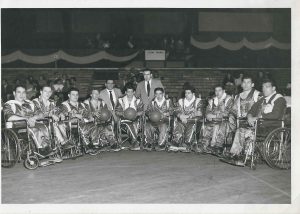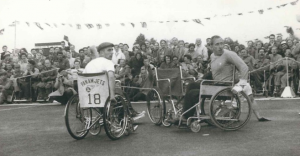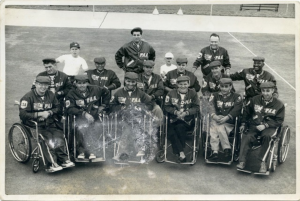SAUL
Saul was born on the Lower East Side in Manhattan, New York and his family moved to Brooklyn at a very young age. He attended New Utrecht High school and later New York Technical College.
 Saul came into his own at age 16 when he became a founding member of the Brooklyn Whirlaways, a wheelchair-based basketball team. The sport was founded in the late 1940’s for disabled WWII veterans, but quickly expanded to include those with polio-related disabilities, and then evolved to include all disabled athletes. Saul was known as being a focused, strategic player and an excellent shot. On the court, he could be passionate, persistent, and assertive. He was also a patient mentor who enjoyed developing talent in younger players. Saul was naturally intuitive and understood what made athletes tick and he used that skill to bring out the best in his teammates.
Saul came into his own at age 16 when he became a founding member of the Brooklyn Whirlaways, a wheelchair-based basketball team. The sport was founded in the late 1940’s for disabled WWII veterans, but quickly expanded to include those with polio-related disabilities, and then evolved to include all disabled athletes. Saul was known as being a focused, strategic player and an excellent shot. On the court, he could be passionate, persistent, and assertive. He was also a patient mentor who enjoyed developing talent in younger players. Saul was naturally intuitive and understood what made athletes tick and he used that skill to bring out the best in his teammates.
 Saul worked for Pan American World Airways after college. The organization and management were supportive of people with disabilities—sponsoring the Pan Am Jets wheelchair basketball team (Saul was a key player), as well as actively employing veterans and those with disabilities.
Saul worked for Pan American World Airways after college. The organization and management were supportive of people with disabilities—sponsoring the Pan Am Jets wheelchair basketball team (Saul was a key player), as well as actively employing veterans and those with disabilities.
 When the coach of the Jets resigned, the team feared they would have to disband, but Saul actively recruited the first African American coach in the history of wheelchair basketball. Saul knew the Jets would benefit from the instruction of Junius Kellogg, a former Harlem Globetrotter, paralyzed in an automobile accident. But with his intuition and understanding of people, Saul also believed Junius would benefit from coaching a team and finding purpose after the near-fatal accident. Saul was proud of his pioneering efforts to bring more diversity to wheelchair basketball, but he cherished his lifelong friendship with Junius. Their bond is testament that Saul’s encouragement and guidance was designed to help someone do and be better—in the game of basketball and in life.
When the coach of the Jets resigned, the team feared they would have to disband, but Saul actively recruited the first African American coach in the history of wheelchair basketball. Saul knew the Jets would benefit from the instruction of Junius Kellogg, a former Harlem Globetrotter, paralyzed in an automobile accident. But with his intuition and understanding of people, Saul also believed Junius would benefit from coaching a team and finding purpose after the near-fatal accident. Saul was proud of his pioneering efforts to bring more diversity to wheelchair basketball, but he cherished his lifelong friendship with Junius. Their bond is testament that Saul’s encouragement and guidance was designed to help someone do and be better—in the game of basketball and in life.
Saul was inducted into the National Wheelchair Basketball Association (NWBA) Hall of Fame in 1976. Always one to go the extra mile, Saul and other NWBA officials lobbied to get the NWBA Hall of Fame included in the National Basketball Hall of Fame. This crowning achievement acknowledged the impact of wheelchair basketball and the influence of their best players by the sport at large. That dedication took place in October 1990.
